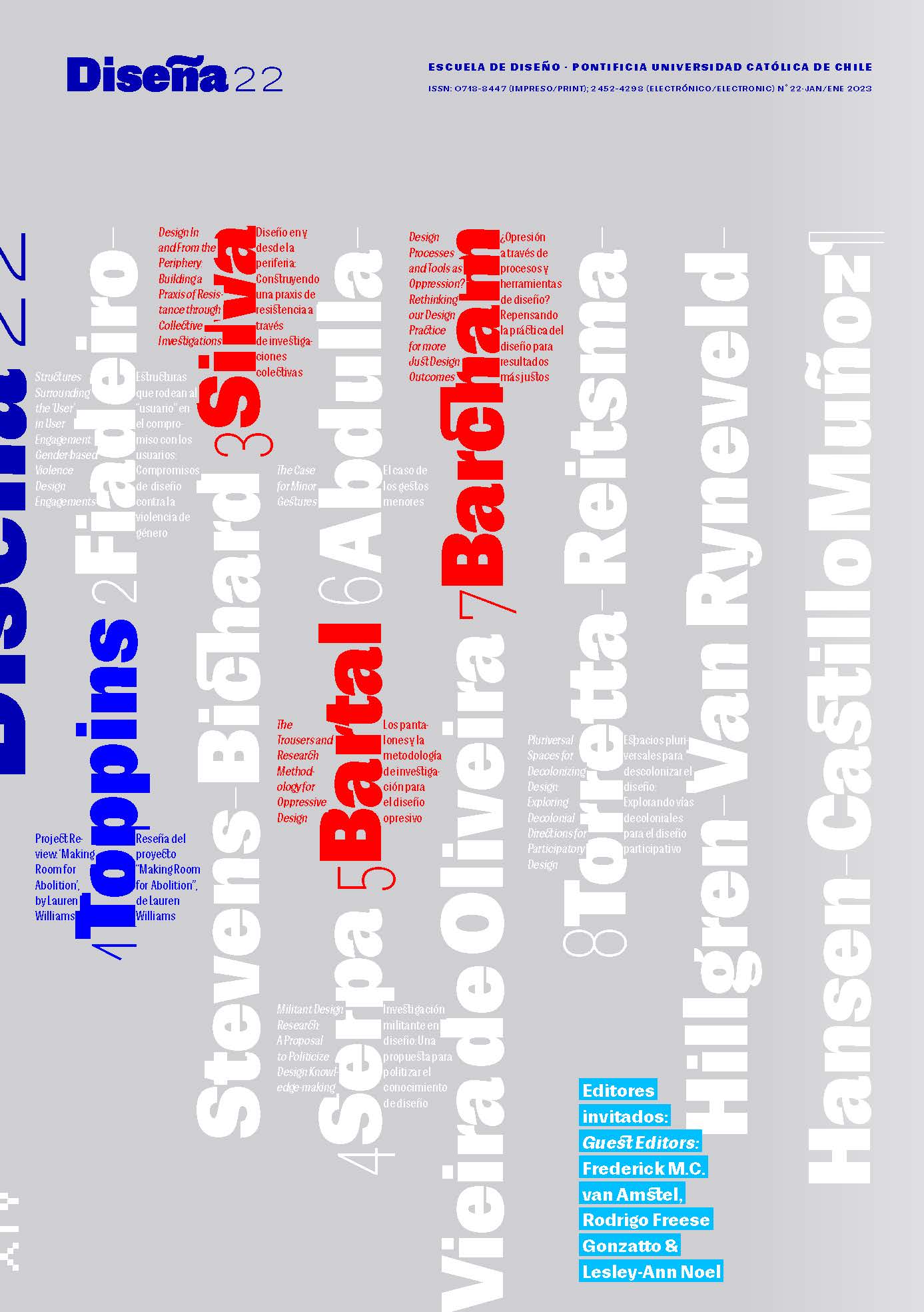Pluriversal Spaces for Decolonizing Design: Exploring Decolonial Directions for Participatory Design
Main Article Content
Abstract
Decolonization is a situated effort as it relates to the relations of privilege, power, politics, and access (3P-A, in Albarrán González’s terms) between the people involved in design in relation to wider societies. This complexity creates certain challenges for how we can understand, learn about, and nurture decolonization in design towards pluriversality, since such decolonizing effort is based on the relationship between specific individuals and the collective. In this paper, we present and discuss the ‘River project’, a participatory space for decolonizing design, created for designers and practitioners to reflect on their own 3P-A as a way to create awareness of their own oppressive potential in design work. These joint reflections challenged ideas of participation and shaped learning processes between the participants, bringing to the foreground the importance of seeing and allowing for a plurality of life and work worlds to be brought together. We build on the learnings from this project to propose the notions of pluriversal participation, pluriversal presence, and pluriversal directionality, which can help nurture decolonizing designs towards pluriversality. We conclude by arguing that, for nurturing pluriversality through Participatory Design, participation, presence, and direction must be equally pluriversal.
Downloads
Article Details

This work is licensed under a Creative Commons Attribution-ShareAlike 4.0 International License.

This work is licensed under a Creative Commons Attribution-ShareAlike 4.0 International license.
COPYRIGHT NOTICE
All contents of this electronic edition are distributed under the Creative Commons license of "Attribution-ShareAlike 4.0 Internacional" (CC-BY-SA). Any total or partial reproduction of the material must mention its origin.
The rights of the published images belong to their authors, who grant to Diseña the license for its use. The management of the permits and the authorization of the publication of the images (or of any material) that contains copyright and its consequent rights of reproduction in this publication is the sole responsibility of the authors of the articles.
References
Albarrán González, D. (2020). Towards a Buen Vivir-Centric Design: Decolonising Artisanal Design With Mayan Weavers From the Highlands of Chiapas, Mexico [Doctoral Dissertation, Auckland University of Technology]. https://openrepository.aut.ac.nz/handle/10292/13492
Broom, A., Hand, K., & Tovey, P. (2009). The Role of Gender, Environment and Individual Biography in Shaping Qualitative Interview Data. International Journal of Social Research Methodology, 12(1), 51–65. https://doi.org/10.1080/13645570701606028
Cunha, P. F. A. da. (2011). Capoeiras e valentões na história de São Paulo (1830-1930) [Master´s Thesis, Universidade de São Paulo]. https://doi.org/10.11606/D.8.2011.tde-11092012-105013
Dindler, C., & Iversen, O. S. (2014). Relational Expertise in Participatory Design. Proceedings of the 13th Participatory Design Conference: Research Papers – Vol. 1, 41–50. https://doi.org/10.1145/2661435.2661452
Dussel, E. (1977). Filosofía de la liberación. EDICOL.
Ehn, P. (1988). Work-Oriented Design of Computer Artifacts. Umeå University.
Ellis, C., Adams, T. E., & Bochner, A. P. (2011). Autoethnography: An Overview. Forum Qualitative Sozialforschung / Forum: Qualitative Social Research, 12(1), Article 1. https://doi.org/10.17169/fqs-12.1.1589
Engeström, Y. (2007). From Communities of Practice to Mycorrhizae. In J. Hughes, N. Jewson, & L. Unwin (Eds.), Communities of Practice: Critical Perspectives (pp. 41–54). Routledge.
Eriksen, M. A., Hillgren, P.-A., & Seravalli, A. (2020). Foregrounding Learning in Infrastructuring: To Change Worldviews and Practices in the Public Sector. In C. Del Gaudio, L. Parra-Agudelo, R. Clarke, J. Saad-Sulonen, A. Botero, F. César Londono, & P. Escandón (Eds.), Proceedings of the 16th Participatory Design Conference 2020—Participation(s) Otherwise (Vol. 1, pp. 182–192). Association for Computing Machinery. https://doi.org/10.1145/3385010.3385013
Escobar, A. (2018). Designs for the Pluriverse: Radical Interdependence, Autonomy, and the Making of Worlds. Duke University Press.
Grosfoguel, R. (2002). Colonial Difference, Geopolitics of Knowledge, and Global Coloniality in the Modern/Colonial Capitalist World-System. Review (Fernand Braudel Center), 25(3), 203–224.
Haraway, D. J. (2006). A Cyborg Manifesto: Science, Technology, and Socialist-Feminism in the Late 20th Century. In J. Weiss, J. Nolan, J. Hunsinger, & P. Trifonas (Eds.), The International Handbook of Virtual Learning Environments (pp. 117–158). Springer. https://doi.org/10.1007/978-1-4020-3803-7_4
Haraway, D. J. (2013). When Species Meet. University Of Minnesota Press.
Law, J. (2015). What’s Wrong with a One-world World? Distinktion: Journal of Social Theory, 16(1), 126–139. https://doi.org/10.1080/1600910X.2015.1020066
Leitão, R. (2018). Recognizing and Overcoming the Myths of Modernity. In C. Storni, K. Leahy, M. McMahon, P. Lloyd, & E. Bohemia (Eds.), DRS International Conference 2018. https://doi.org/10.21606/drs.2018.468
Light, A., Hill, K. J., Hansen, N. B., Hackney, F., Halskov, K., & Dalsgaard, P. (2013). Exploring the Dynamics of Ownership in Community-Oriented Design Projects. Proceedings of the 6th International Conference on Communities and Technologies, 90–99. https://doi.org/10.1145/2482991.2482998
Mareis, C., & Paim, N. (2021). Design Struggles: Intersecting Histories, Pedagogies, and Perspectives. Valiz.
Mignolo, W. D. (2007). Introduction: Coloniality of Power and De-colonial Thinking. Cultural Studies, 21(2–3), 155–167. https://doi.org/10.1080/09502380601162498
Rêgo, W. (1968). Capoeira Angola. Ensaio Socioetnográfico. Fundação Gregório de Mattos.
Simonsen, J., & Robertson, T. (Eds.). (2013). Routledge International Handbook of Participatory Design. Routledge. https://doi.org/10.4324/9780203108543
Tlostanova, M. (2017). On Decolonizing Design. Design Philosophy Papers, 15(1), 51–61. https://doi.org/10.1080/14487136.2017.1301017
Tuck, E., & Yang, K. W. (2012). Decolonization is Not a Metaphor. Decolonization: Indigeneity, Education & Society, 1(1), Article 1.
Vazquez, R. (2017). Precedence, Earth and the Anthropocene: Decolonizing Design. Design Philosophy Papers, 15(1), 77–91. https://doi.org/10.1080/14487136.2017.1303130

